Young leaders show the way for 2018 Budget
Representatives of key industries yesterday presented their main proposals for consideration at the 2018 pre- Budget forum organised by the Daily FT and the Colombo University MBA Alumni Association with Standard Chartered Bank as the Strategic Partner.
Given below are excerpts of their presentations and key proposals.
Gateway College Colombo Chairman Dr. Harsha Alles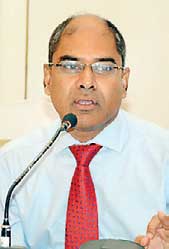
If you take the education sector, especially schools, Sri Lanka has about 10,000 schools in the state sector and we used to have a very strong private sector, such as the church-linked schools, and the new emerging sector is the international schools and the private higher education institutions.
According to the International Schools of Sri Lanka, which I founded and has the best established 24 schools, we have over 40,000 students. Of the non-members, I’m sure there are about another 200 schools. So our sector is substantial and in fact we are now bigger than the private schools where numbers are concerned.
An important thing to remember is that students who attend international schools are not a burden to the Government at all; the Government does not spend one cent on them. Where the institutions are concerned everything is a cost to us, including land and buildings. Traditional private schools have taken many decades to get to this stage but we have to do this within our means.
If the Government wants to attract professionals to return, encourage consultants to be based here then they will look for schools like ours that follow the international curriculum. How the Government should look at this sector is to promote it as a hub, we have great potential. If Malaysia could do it, I think at least in South Asia we should have the possibility to do this.
Proposals
- Strengthen the people in education so that they establish partnerships with foreign organisations rather than directly going and inviting them to step up here.
- No VAT for education was positive but international schools pay all corporate taxes and we used to pay at 10% and now 14%, which is something you need to look into because these costs will be passed on to students. The students at international schools come from a range of social and economic backgrounds.
- People who want to genuinely invest in the industry and buy land, construct buildings, such people should be encouraged. A tax holiday or a similar measure would be welcome as they are long-term investors and would discourage people who get into the sector for a quick buck and rent buildings only to close down later.
Akbar Brothers Ltd. Director Hussain Akbarally
The tea industry has been facing challenging times. On one hand the unrest in key markets such as the Middle East has resulted in reduced volumes and on the other adverse weather conditions at home have impacted production. Unfortunately we can’t always pass on the increased costs to consumers, especially in these lower to middle income countries, which reduces our margins.
One thing I would like to address as an industry is we pay Rs. 3.50 per kilo of exported tea as a Ceylon Tea promotion levy. This is a fantastic idea if used wisely but so far about Rs. 6 billion has been kept in a fund and is in danger of being used as a political tool. Ideally we should use this to give back to the tea industry. Sri Lanka used to be the third largest tea producer in the world but has now slipped to fourth place and it is just a matter of time before we slip to the fifth slot. The industry employs about one million people and is a crucial employment generator.
Proposals
- Take Cess funds and give it back to plantation companies to invest in replanting, new technologies and new investment as well as increase production levels.
- Cess funds to be used to develop new markets. Ceylon Tea is doing fantastically in countries such as China, East Asia and Russia. If Sri Lanka can get funding, tea could be marketed more aggressively in these destinations.
- Lack of consistent power is a challenge. Regular power cuts hamper production costs, especially for outstation factories where the company has had to spend on generators. Power cuts affect profit margins as generators cost four times as much as electricity provided by the national grid. Giving incentives in the Budget to build new power plants would benefit industries significantly.
Spa Ceylon Director Shalin Balasuriya 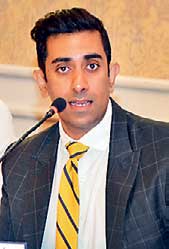
As a company that is taking its brand to international customers, we would like to draw attention to that process. We are creating our own export channels by taking our brand out there and investing in it and building our brand for Sri Lanka. Support in doing that in any way would really help, especially with cost.
Proposal
- Assistance in brand building. One key area is in trademark registration, where registration has to be done in several classes and although in Sri Lanka it’s fairly inexpensive when we go out we have found it is very costly and also the legal fees are very high.
- However, we are not allowed to account for it as an expense in the given year; we are only allowed to account for it as an expense 10 years down the line. Therefore we would be grateful if such expenses are allowed to be accounted for as expenses in the same year as they are made.
Nawaloka Construction Company Ltd. Director Harshith Dharmadasa
Proposals 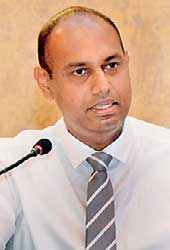
- The establishment of a real estate investment trust I believe is in the final stages of Cabinet approval. If this is expedited there will be a lot of foreign investment that will be attracted to Sri Lanka. This will also enable local and small-time investors to be part of the growth. So if we can get this going it would really assist our sector to move forward.
- For the upcoming Budget, if companies are doing advertising and marketing in foreign countries then provide them with incentives so that they will encourage them to seek foreign investment. This would also promote tourism. A tax exemption for this would be ideal if it could be considered.
Chairman Asia Securities Ltd. Dumith Fernando 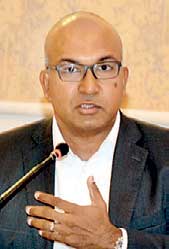
The underlying theme here is that we are trying to build a prosperous society. Prosperity comes from earning more money and also investing and saving it better. I decided to take the approach of talking about capital market development from the aspect of creating an entrepreneur’s paradise. I think in terms of better funding for them and generating investment there is greater opportunity.
In addition, about 25% of our population is over the age of 55 and so savings and investment becomes a very important part of how we maintain prosperity.
Proposals
- Activation of the Cess fund. In our industry there is a Cess fund of about Rs. 2.6 billion. Expect it to grow to Rs. 5 billion in four years. I think there are three ways this could be used but I’m sure there are other brilliant ideas as well.
- One would be to create an education program where modules of personal wealth management are taught to students. Unless you are in the commerce stream few people learn how to balance their accounts and that education gap leads to a reduced understanding of how to manage money later in life.
- Second would be to use funds to create better regulations for market surveillance, which has not really happened. This would increase trust in the capital markets and encourage more investors.
- Broaden finance education beyond school level.
- Provide tax-free incentives for listed share compensation for listed companies. This would make the market more attractive to foreign investors as it would create more liquidity. So one idea we would like to push is that 5%-10% of a company can be given out as share-based compensation and that can be tax-free so there is an opportunity for both the company and recipients. The Government would also increase revenue through the Share Transaction Levy (STL).
To make the capital market more vibrant, list appropriate state-owned enterprises (SOEs). Without doing this trying to push our capital market would be like trying to get a plane off the ground without its wings. This is probably the single most important thing we need to develop our capital markets. We are not talking about privatisation here; we are talking about opportunities to raise capital.
Orion City CEO Jeevan Gnanam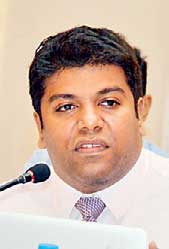
Primary concentration of improving entrepreneurship by improving access to funding, access to markets and reducing cost of failure. Funding challenges remain and tax systems are not very positive of start-ups and the challenges they face. We also need to look at alternative types of funding such as crowd funding but again the legislation needs to be changed around crowd funding.
Proposals
- Create a system with tax incentives to promote start ups. Incentives for start-up investments should include provisions to avoid double taxation.
- Give Government grants for start-ups at the beginning for research and development as well as other needs.
- Access to markets is necessary as start-ups struggle despite proposals to establish Sri Lanka as an IT hub. Incubation labs such as those established in Singapore to promote startups regionally as well are needed.
- Access to payment platforms such as Paypal and Stripe could also be a revenue earner for the Government.
- Cost of failure is very high in Sri Lanka presently and needs to be adjusted as entrepreneurs learn from experience and the current laws do not allow for risk-taking. Therefore propose adjustments similar to the US where under Chapter 11 businesses can close with limited impact.
Kapruka.com Founder/CEO Dulith Herath 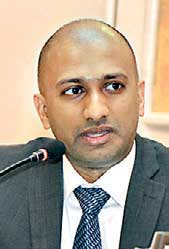
We in the ecommerce industry have seen this increasing of single packages that are coming into the country through Alibaba, eBay and other websites. Initially we thought this was small but it’s almost like products raining into the country and its going undetected because they arrive directly on to the doorstop.
This means local traders in Pettah have to compete with eBay, so we have to control this, in my view at the post office level for it to be fair trade and improve commerce in a competitive way.
Blue Mountain Group Chairman Hiran Hettiarachchi
Proposals
- In the last Budget, proposals were made for Real Estate Investment Trust (REIT) but this was not implemented. We propose the strengthening of REIT and believe this would be positive for the industry.
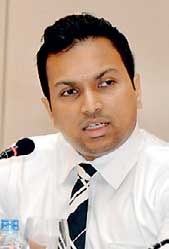 We suggest strengthening the bond market in Sri Lanka because real estate developers mainly depend on a few sources of funding. We propose the bond market is also strengthened along with the currency derivatives market to increase funding sources.
We suggest strengthening the bond market in Sri Lanka because real estate developers mainly depend on a few sources of funding. We propose the bond market is also strengthened along with the currency derivatives market to increase funding sources.- Suggest reinstating provisions to claim VAT from customers. As some projects in Sri Lanka are VAT-exempted we don’t have a level playing field.
- Propose licensing the developers. This is mainly to protect the customers as many small developers have entered the market without a strong financial background or experience and this has led to increased risk in standards. If a small-scale developer makes an error then it can impact the whole sector.
- We would also like to request the Government’s blessing towards the real estate sector as certain officials representing the Government are spreading the fear factor to the market where that can create a negative impact on local and foreign investors.
Aitken Spence Hotel Management Ltd. Director Stasshani Jayawardana
Proposals
- Since under the new Inland Revenue Act all private sector companies will be taxed at one rate of 28% we request returning the Transfer Pricing Regulations.
- Request the Government to continue infrastructure projects. While there are currently strategic investment projects there are few companies classified for assistance under this category. One reason may be that the threshold of investment is high and the approval process is very cumbersome and time-consuming.
- While we agree with the Government’s policy of removing tax exemptions for large projects we think that upfront levies and taxes that are required to be paid for such projects even before construction commences be relooked at. In the case of NBT and PAL the significant outlay at the start of the project drives up costs by as much as 25%, which has to be incurred by the company before commercial operations begin. Since these infrastructure projects are of national important we suggest that projects are evaluated and a selection is exempted from NBT and PAL in the project implementation stage to encourage investment in such projects.
- VAT and Customs Duty exemptions for capital investment in the refurbishment of hotels with more than 100 rooms. As the Government is focusing on tourism development Sri Lanka needs to refurbish its hotels at least every seven to ten years to provide a competitive advantage regionally. At present VAT deferments are not granted even though proposed refurbishment adds up to substantial amounts. In most cases these are large resorts, which can be as much as the cost of construction of a small new hotel or boutique hotel at times, and these are given exemptions under the BOI. These could be considered as a new investment. We propose that the Customs Duty be deferred for refurbishment projects with more than 100 rooms, thereby reducing the tax burden on companies.
Mclarens Group Ltd. Joint Managing Director Shehara Jayawardena
Proposals 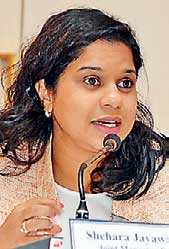
- As Sri Lanka has ambitions to be a maritime hub it would be imperative that all the shipping and shipping-related services are provided at regionally competitive rates. This would include bunkering and a host of other services. In Singapore at any given time there are 6,000 ships in anchorage simply to avail of the services provided at the port. Sri Lanka can easily attract a percentage of this market. So we need to provide the regulatory framework for this sector, which includes de-regularisation.
- Proper clarification of shipping related services so that they are eligible to be given concessions.
With introduction of NBT Act want clarity of shipping and related services. If this 2% on the turnover is brought in it will act as a deterrent.
OREL Corporation Ltd. Managing Director Kushan Kodituwakku
Proposals 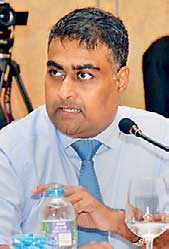
- Promote invoicing software so that in real time a company can know if its transactions.
- Get Inland Revenue Department assessors to be your partners so that they can assist to grow the business and change the dynamics of how people would view the Inland Revenue Department.
- Because of the regulatory measures of the Government, companies have to recruit more staff. For example we have about 20 people in our Accounts Department whereas a company in the UK may have two. As the Government moves forward to sign Free Trade Agreements (FTAs) we need to also adjust these regulatory frameworks so that companies can become more streamlined and competitive. Would like to see things become simplified.
ACL Cables Plc Managing Director Suren Madanayake
Proposals 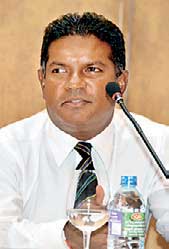
- SVAT collection difficult and should be reconsidered.
- Evaluation for Govt. tenders needs to be consistent. Currently different tender committees employ different methods. Would like to see the same criteria applied to enable more consistency.
- Some local exporters only export about 20% and it used to come under a preferential tax rate, which has been taken out in the new Inland Revenue Act. Consider possibility of reinstating that provision.
- Encourage backward integration with incentives and possible preferential duty rates for primary raw materials.
Diesel and Motor Engineering Plc General Manager 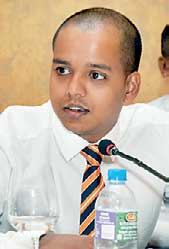 Rajeev Pandithage
Rajeev Pandithage
As a developing country we need mobility to grow and with new roads and highways coming up this sector has become very important.
Proposals
- Unlike other countries we have a very high tax regime, which is necessary, but my suggestion is to have a stable tax regime. We have changed our tax systems more than 20 times in the last four years.
- One other factor is the issue of valuations, which is arbitrary, and can have significant impact on the end price. Therefore the genuine importer of a vehicle is not competitive in the real market.
- In the goods transfer segment Sri Lanka imports trucks that are over ten years old. The long-term implications are that vehicles that are written off as unfit for the road in other countries end up in Sri Lanka. So Sri Lanka should not be a dumping ground for old vehicles, especially in the goods transport sector.
- Sustainable view on electric vehicles. It is the future but need to look at a long-term plan for importing these vehicles.
- Disposal of old vehicles could be more efficient if plans can be approved to strip down vehicles and there are many countries that would accept our properly sorted garbage. Would make most of our re-export and earn revenue for the country.
Access International Ltd. Director Shamal Perera
Proposals 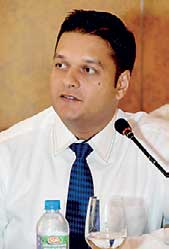
- We find that most of our best qualified professionals are leaving the country for better opportunities overseas. Going back to the 1980s and 1990s, Sri Lanka had a system where first time homeowners could get their mortgage deducted against their tax. A lot of private sector employees used this method to their advantage and it stopped a lot of brain drain from happening. I believe that if we can ease these expenses then we can stop people from buying cars with their first salary and go for buying houses. This in return would promote the real estate, retail and banking businesses as well. So we suggest the Government reconsiders giving incentives to first time home buyers.
- In the private health sector there is excess capacity and there is excess demand in the Government sector. To my understanding there is severe down time in healthcare machines and the main objective of the government healthcare system is not to maintain medical equipment but to provide health services. I’m happy to understand a Public-Private Partnership (PPP) Unit has been established but I’m sad to say in regard to the health sector no one in the Health Ministry has been told such an initiative has been established. So proper coordination between the ministry and PPP Unit has to be established.
- Medical professionals earn up to 80% of the cost of private hospitals and with the introduction of VAT it is a very simple calculation on the earnings of medical professionals but still the Government struggles to understand how much they earn compared to how much they declare. I’m not trying to ruffle anyone’s feathers but I’m just giving my suggestion on how we can increase our revenue.
DFCC Bank Plc CEO Lakshman Silva
Proposals 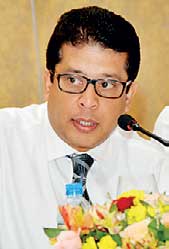
- Rationalisation of taxes is required. Currently banks directly and indirectly pay as much as 40% or more of taxes. We are required to be rated but when it comes to some of the taxes there is no differentiation between the banks on their ratings. Over the last five or six years banks are paying a crop insurance levy that had been introduced six years ago but we have not benefitted from it. In addition, deposit insurance was introduced when finance companies went through a troubled period and now all the banks, regardless of their ratings, all these payments have to be made. This is one of the key things the Government can look at when rationalising tax policy moving forward.
- We are in doubt about the tax levies to come up in the statutory investments we are expected to make with the Central Bank. Treasury Bills and bonds we are not sure of the applicable rates because of the information we have received with the rate to be increased to 14% but whether that is deductable tax or whether it will be a pay on top of taxes applicable on general income. If that duplication happens, naturally there will be an impact on the market.
- Banks have actively participated in Sri Lanka development bonds and interest earned through that was exempted so far going forward it is not known yet what the situation will be. We would like this issue addressed.
Renuka Hotels Ltd. Joint Managing Director Shibani Thambaiyah
Proposals 
- High direct and indirect taxes faced by the industry are challenging. Sri Lanka has the highest total outflow of taxes on top line revenue in the region, which means Sri Lanka outprices itself in the region and we need help to look into this.
- Sri Lanka’s hotel and restaurant industry accounts for 6% of the total VAT collected, which is the third largest after the banking and insurance industries. So it would be good for the Government to grant concessions for the industry by granting concessions by reconsidering the tax structure.
- Regulation needed for the informal sector, which is as high as 50%. We understand that the Government is already attempting to bring these establishments into the tax net. We urge you to look into this as it would create a level playing field. Also propose collecting a flat tax rate from all unregistered establishments, which is also done regionally.
Sunshine Holding Plc Director Shyam Sathasivam 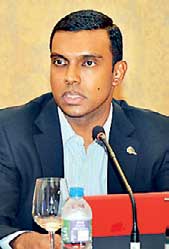
Proposals
- Address the lack of a world-class quality assurance lab. Even though discussions have been around for a long time, the resources and impetus from the Government have been absent. A lot of pharmaceutical products can be tested in this way and it would also ensure standards. Pharmaceutical drugs worth about Rs. 40 billion make their way to Sri Lanka every year and some of this is substandard and this can be handled efficiently. We propose that this be set up as a public-private partnership where the private sector sets it up and the Government can use the services. This can be done across the board and the Government can charge companies for using this. There is much public enthusiasm for this but the mechanism is still missing. Moreover this cannot be done only by the Government because ensuring world-class expertise and standards cannot be done by the State alone. We can work with the ASEAN region and if we want to export drugs then we have to meet international standards.
- Introduce healthcare vouchers so that all citizens are given access to healthcare but the Government does not have to perform all those services.
- In tea, if we are going to build a large export base then we need to build brands. However, local companies may not have the resources so I see things like what Fonterra has done, which is gathering a large number of producers into one corporate conglomerate that can go outside the country and build. Either we have to go out and buy brands or the government should go out and buy this and support this process. The State needs to back this process rather than letting the private sector line up at a public bank. We need support not so much funding.
WSO2 CEO and Chief Architect Sanjiva Weerawarana
Proposals 
- The brain drain is a severe problem. If it were up to me I would eliminate all taxes and rationalise all vehicle taxes once and for all because this is a key aspiration of all people. It is important for the Government to focus on a stable environment for people to live in. We need to address ways to attract people back but first we need to stop them from leaving.
- The Government almost always insists on buying foreign software and it does it indirectly by saying it should have high revenue to bid for a specific tender. Most software companies don’t have such revenues. So the government should make this a place where local companies get a chance to sell their products to the Government and give incentives to do so because foreign companies pay Sri Lankan companies to make systems.
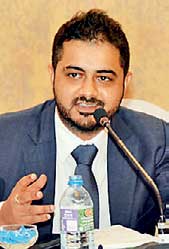
Expo Lanka Freight Ltd. Managing Director Saif Yusoof
Digitalisation is very important and has to be a fundamental part of the Government’s vision. This could change everything and all sectors can be revolutionised because what we require now is speed. Create a Government portal that would open digitalisation to the consumers and public. Have a clean slate plan for education, police or anything you can name. In places like Bali people are flying in from around the world to work, we can create such ecosystems here as well by bringing this new youth, which would give exponential growth.
Astron Ltd. Director/COO Ross De Zilwa
Proposals 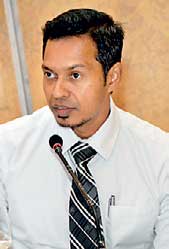
- Request PAL is waived on active raw materials, which are imported for the domestic manufacture of pharmaceuticals. These cannot be used for anything else and would enable us to be more competitive when it comes to export prices and imported similar pharmaceuticals to not have PAL or other taxes on them. This places domestic producers at a disadvantage against similar imported products.
- Request that domestic pharmaceuticals be exempt from price control.
- In 2014 several pharmaceutical companies entered into a buy-back agreement with the Health Ministry through tenders. We would like to request formalisation of this agreement and it be extended for a further five years and additional products that we supply be added onto the list and continued till 2024.

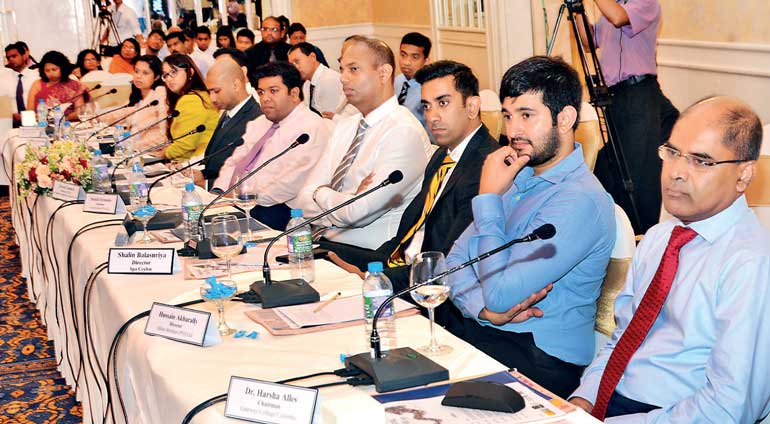
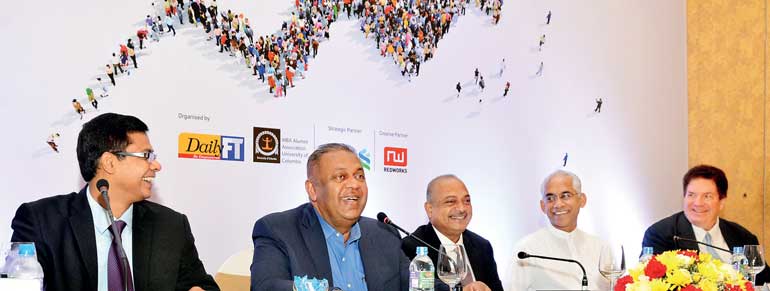 Finance Minister Mangala Samaraweera speaks at the Daily FT-Colombo University MBA Alumni Association organised 2018 Pre-Budget Forum at the Hilton Colombo. Others from left MBA Alumni Association President Irshan Jayah, Daily FT Editor Nisthar Cassim, State Minister of Finance Eran Wickramaratne and forum’s strategic partner Standard Chartered Bank Sri Lanka CEO Jim McCabe
Finance Minister Mangala Samaraweera speaks at the Daily FT-Colombo University MBA Alumni Association organised 2018 Pre-Budget Forum at the Hilton Colombo. Others from left MBA Alumni Association President Irshan Jayah, Daily FT Editor Nisthar Cassim, State Minister of Finance Eran Wickramaratne and forum’s strategic partner Standard Chartered Bank Sri Lanka CEO Jim McCabe
Govt. lends ear to private sector wish list for next Budget
By Uditha Jayasinghe
Taking on board proposals from the private sector, Finance Minister Mangala Samaraweera and State Minister of Finance Eran Wickramaratne yesterday acknowledged concerns and growth plans from companies and pledged to continue engagement on key points.
Speaking at the 2018 pre- Budget forum organised by the Daily FT and the Colombo University MBA Alumni Association, with Standard Chartered Bank serving as the Strategic Partner, State Minister of Finance Eran Wickramaratne responded candidly to the proposals and challenges presented by the private sector. In relation to requests for tax concessions and exemptions, he emphasised that the Government remains committed to maintaining the stipulations in the latest Inland Revenue Act.
“We have only one tax rate and that is 28%. The Bill is an effort to go into a more rules-based system rather than having to sit outside Mangala Samaraweera’s office. This is the change. A concessionary rate of 14% is applied because there are no zeros in the system and therefore this is the lowest rate. We have a few sectors such as agriculture, exports and education at 14% and we can argue why some are in it and others are not. But it is a debate and it has been settled in this particular way.”
Raising capital
Capital investment allowance is one way forward, he suggested, that would allow for the recovery of investment. He also said that regarding tea, Sri Lanka has a long-term problem that would need greater attention and deeper policies but acknowledged the Government does not want to see the industry deteriorate further.
However, he noted that concerns over Cess would be addressed, and the discussion had already begun. On trademark costs of registration, the State Minister called for a note that would be further explored by the ministry.
“We fully take on board the issue of state-owned enterprises (SOEs). Here again you mentioned the banks and banks are capital short. So there is no way forward apart from raising capital and this is essential for growth. If private banks raise capital and expand then the state banks will inevitably lose market share. If they are to compete, the state banks need to raise capital. The Government Budget is constrained and so will not be able invest in State banks. So please help to get this message across. One way is to focus on their core businesses,” he said, predicting that the local sector will adjust along international trends.
He conceded that legislation would take time for startups, digitisation, access to payment systems, booking platforms and incubation labs but polices for all these are being considered by the Government. “It’s on our list because we are very keen to levy taxes,” he said, eliciting laughter from the audience. Discussions on bankruptcy laws have also resulted in a “white paper” and the Finance Ministry will get involved to see that it is going in the right direction.
“The Budget is not the Government’s big policy statement. The Budget is a part of the Government’s policy,” he added.
Institutional independence
On real estate he acknowledged industry concerns but insisted that as the Central Bank is an independent institution the Government could not dictate what it could or could not say.
“If the Central Bank is making statements then that is because they have reason to do so. We have a responsibility towards the public and we cannot let a situation like what happened in 2008 and 2009 or in Malaysia happen again and then later yell at institutions for not letting their message be known. I, as a part of the Government, may also not like some of the things that are said but I need to say that in defence of the statement made,” he stressed.
Tourism remains a favoured sector, Wickramaratne assured, noting that the country continues to be dependent on its revenue but said debates on Airbnb and other booking platforms need to be within the industry and once a consensus was reached, should tell the Government what steps to take. The Government would look to “creatively tax” booking platforms.
Positive sentiments: SCB
Standard Chartered Bank CEO Jim McCabe was also upbeat about Sri Lanka’s prospects for growth and reforms.
“I believe we are all aware of the precarious state of the country’s public finances, which this Government has inherited. But things are looking up; the deficit is narrowing, the tax to GDP ratio is reducing, recent regulation has been passed to broaden the tax net, reserves have improved and several high-profile PPPs are underway. We can expect key FTAs over the next few months that will unleash a faster pace of growth.”
“The time is now to build a strong working partnership between the private and public sector so that in all aspects the economy and society can participate in the improving trend. This will require significant give-and-take with dialogue and genuine trust between all parties. The country’s annual Budget can be that instrument to engender improved relations in many sectors of this economy. I believe we can all agree that the past two Budget processes created much expectation but also disappointed, possibly due to their desire to encompass too much change all at once. My recommendation would be to set our sights on fewer key issues and then ride that sense of achievement into the following years.”
He noted that economists projected Sri Lanka to grow in the New Year with stronger macroeconomic indicators including moderate inflation and reduction of private sector credit growth to 15% along with stronger reserves and better fiscal consolidation. This will over time reduce debt, he said, but acknowledged that in the short term Sri Lanka would have to tackle wide trade deficits and work to attract investment. He also called on the private sector to be more aware of the developments internationally and regionally as well as work to improve connections so that it is better positioned to deal with the challenges and opportunities available.
